WordPress isn’t the only modular content management system (CMS) that has an established base and active community. Joomla is also a free-to-install, open-source platform that thrives on its third-party support. Many developers work to extend their capabilities beyond what comes built into the base software. When taking a look at WordPress vs. Joomla, you will see several functionality differences, as well as user experience and technical requirement differences.
In this post, we’ll compare WordPress to Joomla, so you can decide which one will work best for you!
WordPress vs. Joomla: Who Are They For?
WordPress does its very best to be the jack-of-all-trades CMS. What we mean is that anyone who needs a website can build it with WordPress. And generally, with minimal experience. It might not be the most advanced website out there, but the tools are easily accessible and understandable by anyone through various third-party plugins and themes.
Users will find a mild learning curve with WordPress, but it doesn’t take long to get beyond that. You will quickly find yourself using posts, pages, themes, plugins, and widgets like a pro. Users who have never had a website before can feel relatively confident in having a nice-enough WordPress site built without too much trouble.
Joomla, too, is a be-everything-to-everyone CMS. Its development history is much different than that of WordPress, especially in that it was created to be a full-site CMS from the beginning. WordPress began as blogging software, so features and updates are still built on that foundation. Both are built on PHP, but Joomla users (especially developers) have a much more traditional foundation in that Joomla can be used out of the box with straight HTML, CSS, JavaScript, and PHP without having to learn the “WordPress way” of doing things.
That said, Joomla does feel like a CMS that beginners would have a good time using. The backend interface is clunky, and the terminology and messaging for new users (inside Joomla itself) are barebones. Installing modules and getting things in working order is far more technical than WordPress. For those with tech and website experience, though, there’s a lot of freedom to be had in Joomla.
WordPress vs. Joomla: Ease-of-Use
While WordPress has a moderate learning curve for new users, the core of the experience is based on blogging. This means that nearly every feature can be boiled down to creating a post or page in some manner. Themes and plugins simply expand on that functionality. Joomla has always been a CMS meant for site developers, meaning that new (non-technical) users would have a greater learning curve. For those with a background in traditional computer science and web development, Joomla may even have a smoother learning curve than WordPress.
WordPress
WordPress is easy to use. The admin dashboard is straightforward in most ways, highlighting the main areas of focus (Pages, Posts, Media, and so on) in the left-hand sidebar.
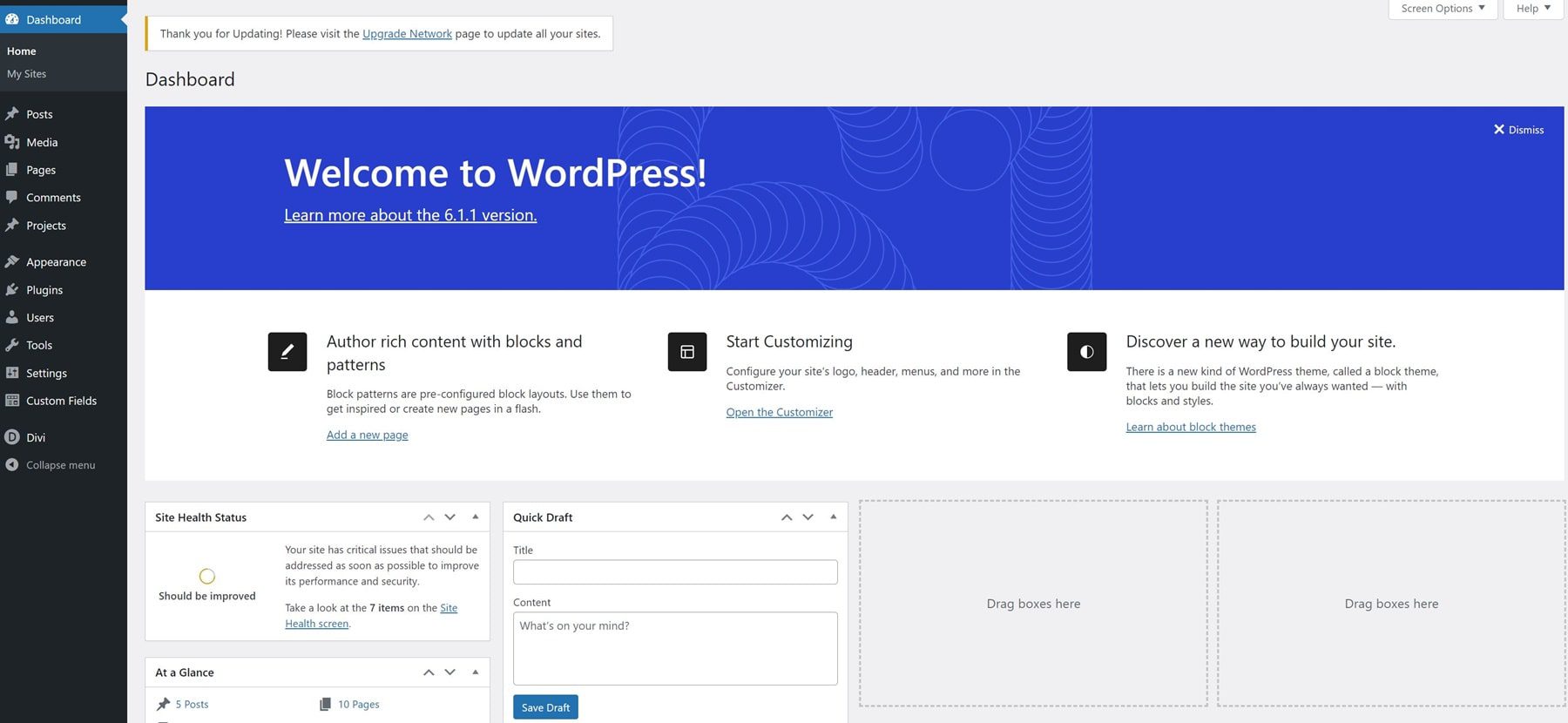
You do have to learn where certain elements are, such as various settings, tools, and menu editing. But in general, once you learn where those are and how to access them, the interface is relatively intuitive.
One of the more difficult aspects of using WordPress is making sure that you have the right suite of plugins to complement your theme. There are thousands of free themes and plugins in the WordPress.org repositories and even more premium options, such as Divi, available from third-party developers.
Making the right choices—and even knowing which choices are necessary—can take a little figuring out. If you’re just getting a feel for WordPress, you might not know what features your site needs and which plugins and themes can provide those. All of that becomes much clearer and simpler once you’ve spent just a little time using the platform and doing some outside research.
For typical users, most WordPress features can be carried out with just a few clicks. Since the base of the platform is based around posts and pages, the basic workflow becomes familiar very quickly, with only a few variations depending on the task.
Joomla
We’d like to say that Joomla has the kind of quick-to-learn workflow that WordPress offers. But that’s just not the case. At least for many users. If you’re an average web user who is looking to set up a new website, Joomla might not make a whole lot of sense at first. (And for a good while after that.) If you’ve built and/or coded websites before, Joomla shouldn’t be that hard to pick up.
The backend, though, is not intuitively put together. Joomla’s admin panel does have a quick-menu sidebar to the left, like WordPress. But most of the features and utilities live on the top menu, and you access those via dropdown.
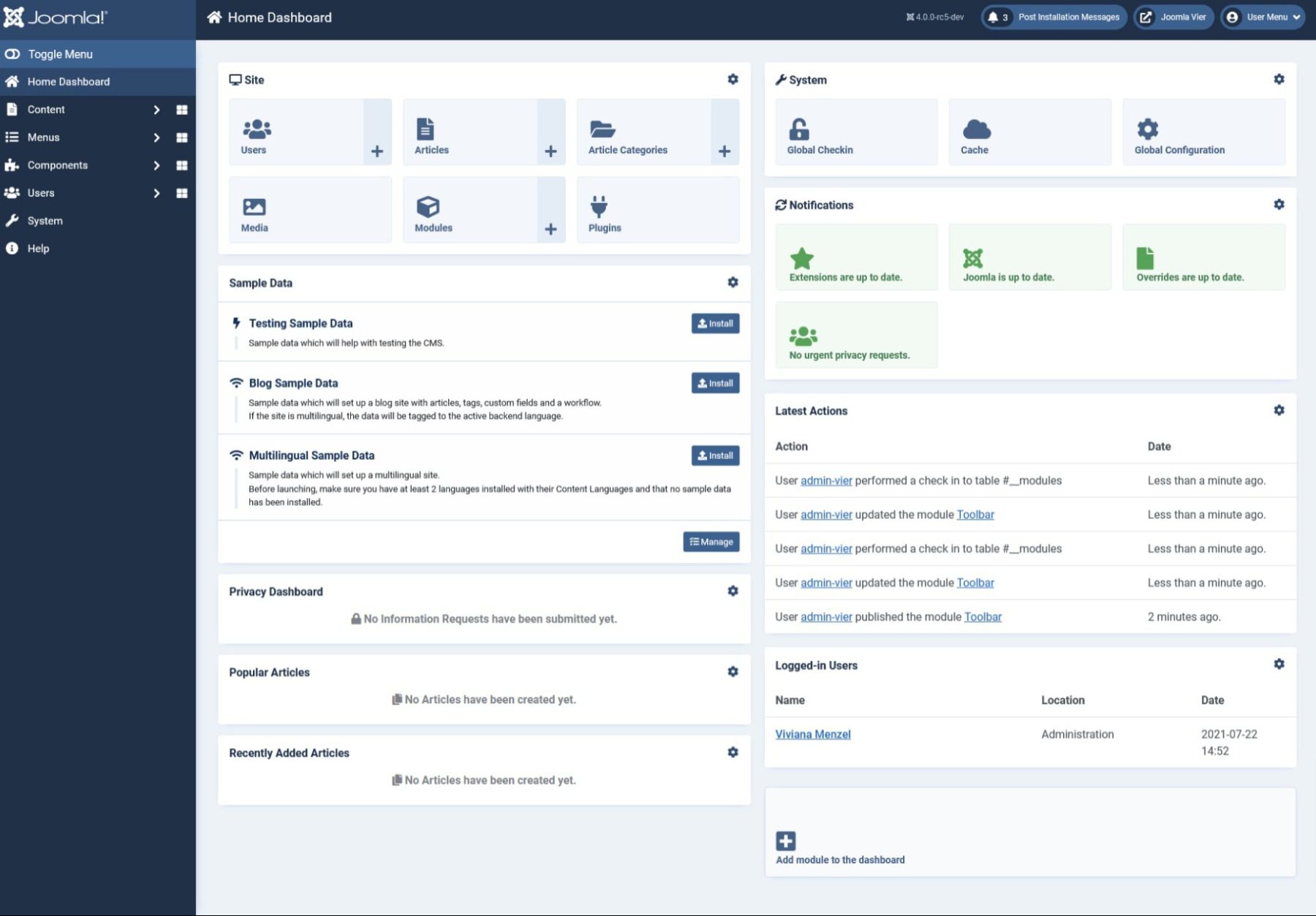
Additionally, on installation, you will be asked if you would like to import blog sample data. We recommend that you do. That’s where you will find most of the new-user orientation material set up as content on your new site.

Having any new-user content being an optional import as sample data is just weird. It is not an intuitive way to introduce someone to the Joomla platform. At all. However, the Joomla community has some fantastic training content with which you can learn Joomla.
With the time we’ve spent learning and exploring Joomla, it never really became smooth and second nature to perform any tasks. The menus in Joomla do make sense (unlike WordPress), but navigating through them is frustrating. You can’t click a new menu item until you’ve closed the current one.
All-in-all, Joomla’s not that easy to use. It is developer-friendly, for sure, but not end-user friendly at all.
Ease-of-Use Comparison
 |  |
|
|---|---|---|
| Ease-of-Use | 🏳 Draw WordPress is relatively easy to use and most users will be acclimated within just a few minutes. However, the advanced features will take much longer to master. | 🏳 Draw Joomla's primary focus is on more advanced technical user, so it has a larger learning curve. |
| Choose WordPress | Choose Joomla |
WordPress vs. Joomla: Customization
WordPress thrives on customization. Extensibility via plugins and themes allows for unlimited choices in terms of design and feature sets. Even a user with no technical experience can start a WordPress website and have it look more or less professional without a lot of hassle. Joomla, too, is built around customization. But not for the end-user. If you’re a content creator or site owner without a great deal of technical expertise or design experience, Joomla’s customization options may be both confusing and near-impossible to decode.
WordPress
Through plugins and themes, WordPress can be whatever you need it to be. You can add e-commerce features with a few clicks. You can install a new page-builder tool for more advanced options over the Gutenberg editor. And each theme you install comes with its own unique set of customization options. Most of the time, these are consolidated into the built-in Theme Customizer.

Users with more advanced skills can add CSS through this page, or they can delve into the core WordPress files and edit the PHP directly. The file structure is designed so that any customizations are held separately in a child theme so that the base you’re customizing is always there to go back to.
In that way (and many others), WordPress encourages poking and prodding and seeing what is the best fit for your site. Try on different themes, widgets, and plugins to add features and design to see what works and what doesn’t. Resetting things back to as they were only taking a few clicks, regardless.
Joomla
Joomla is also an incredibly customizable platform. It, too, has hundreds of templates and themes, and extensions to install to customize your site. You can download them from the official Joomla repo that is directly accessible from the dashboard. Both design and functionality add-ons can be found in the same place, separated by category.

Installing them doesn’t take more than a few clicks. You can then navigate back to the admin dashboard to enable and adjust their settings.
And while you do have every bit as much freedom as you do in WordPress, the Joomla options and customizations are generally less user-friendly and more complicated to get right. Placing them on the site often has you choosing a “position” number that has no human-readable name. With that and because of how the content on the site is displayed, it takes some real time to get things displayed where you want. Not to mention actually testing and implementing features and utilities.
Joomla has a ton of power under the hood, and you can customize it however you want. But you will definitely work for it using Joomla vs. WordPress.
Customization Comparison
 |  |
|
|---|---|---|
| Customization | 🥇 Winner You can't really compare to WordPress when it comes to customization. It's what they've built their platform on and it requires little technical knowledge to integrate. | Joomla has a lot going for it in terms of customizability. But, it takes more technical experience to fully take advantage of the options available. |
| Choose WordPress | Choose Joomla |
WordPress vs. Joomla: Publishing
The internet is about content. And your website is about displaying your content. So we have to touch on what your experience will be in terms of content creation and publishing using WordPress vs. Joomla.
WordPress is a blogging platform at heart. It’s built to win this head-to-head from the beginning. It’s simple and intuitive. Anyone can publish to their site’s feed without hassle or add a static page just as easily. Joomla, on the other hand, isn’t made solely for publishing regular content. And it shows. Every page, post, and note on your Joomla site is contained under the header of Articles. This kind of obfuscates the publishing process enough that it’s just not a pleasant experience.
WordPress
WordPress 5.0 introduced the block editor. Replacing the classic WYSIWYG editor, content creators can now control options and settings for every paragraph (even sentence if they so choose), image, gallery, or embed on the site. While the block editor is not everyone in the WordPress community’s favorite new feature, the interface is slick, simple, and new and old users tend to like using it to create content. Both in terms of blog posts and static pages.
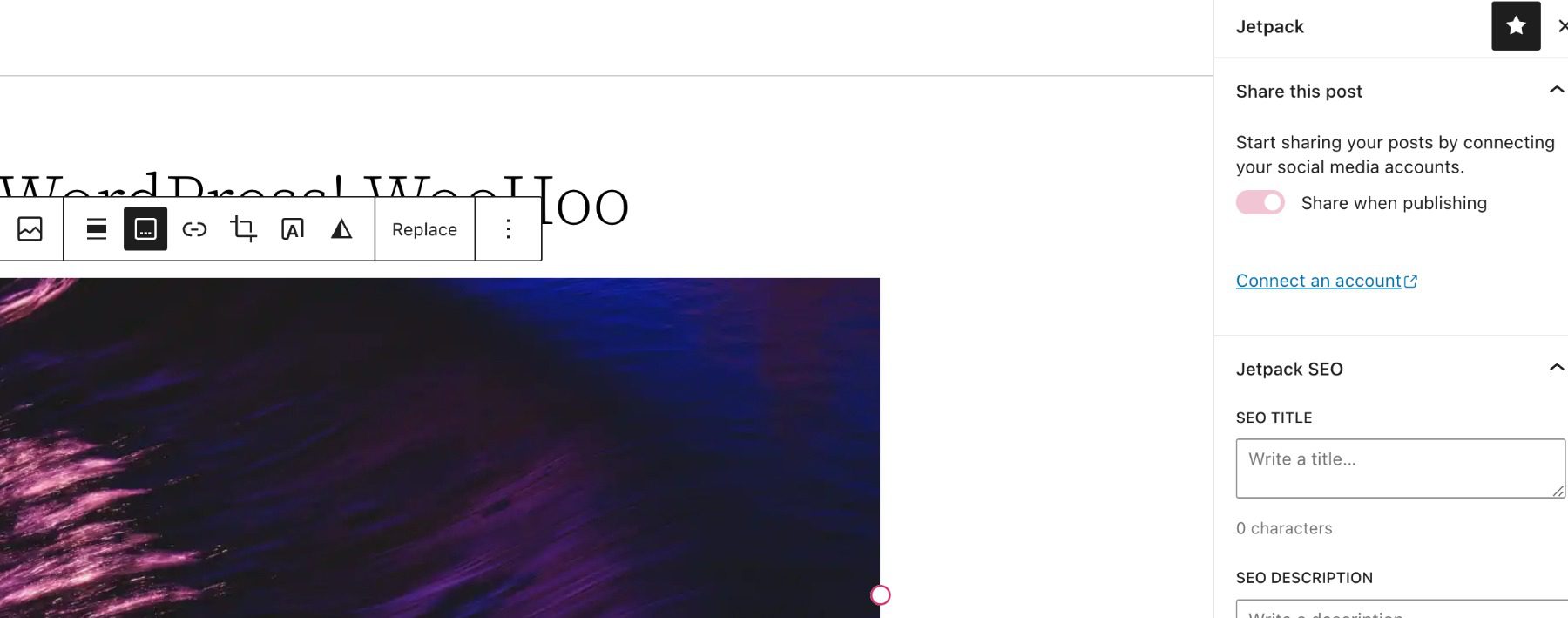
With various post types delineated in function and separated within the interface, it’s easy to understand what you’re creating and how to use it. Posts are for regular content. Pages are for static content that won’t enter the feed. You can use Custom Post Types to add features like Products to plugins like WooCommerce.
The entire process is simple and understandable within WordPress itself. The Add New button under Posts brings you to the editor, in which the placeholder text explains what to do, and a big, blue Publish button sits up top. In that same window, you have the option to adjust that content’s permalink and meta information.
Joomla
In Joomla, creating content is technically as easy as it is in WordPress. The publishing editor Joomla uses is TinyMCE, which is the same editor that WordPress used until version 5.0. So anyone with familiarity there (or with other WYSIWYG editors) will feel right at home.
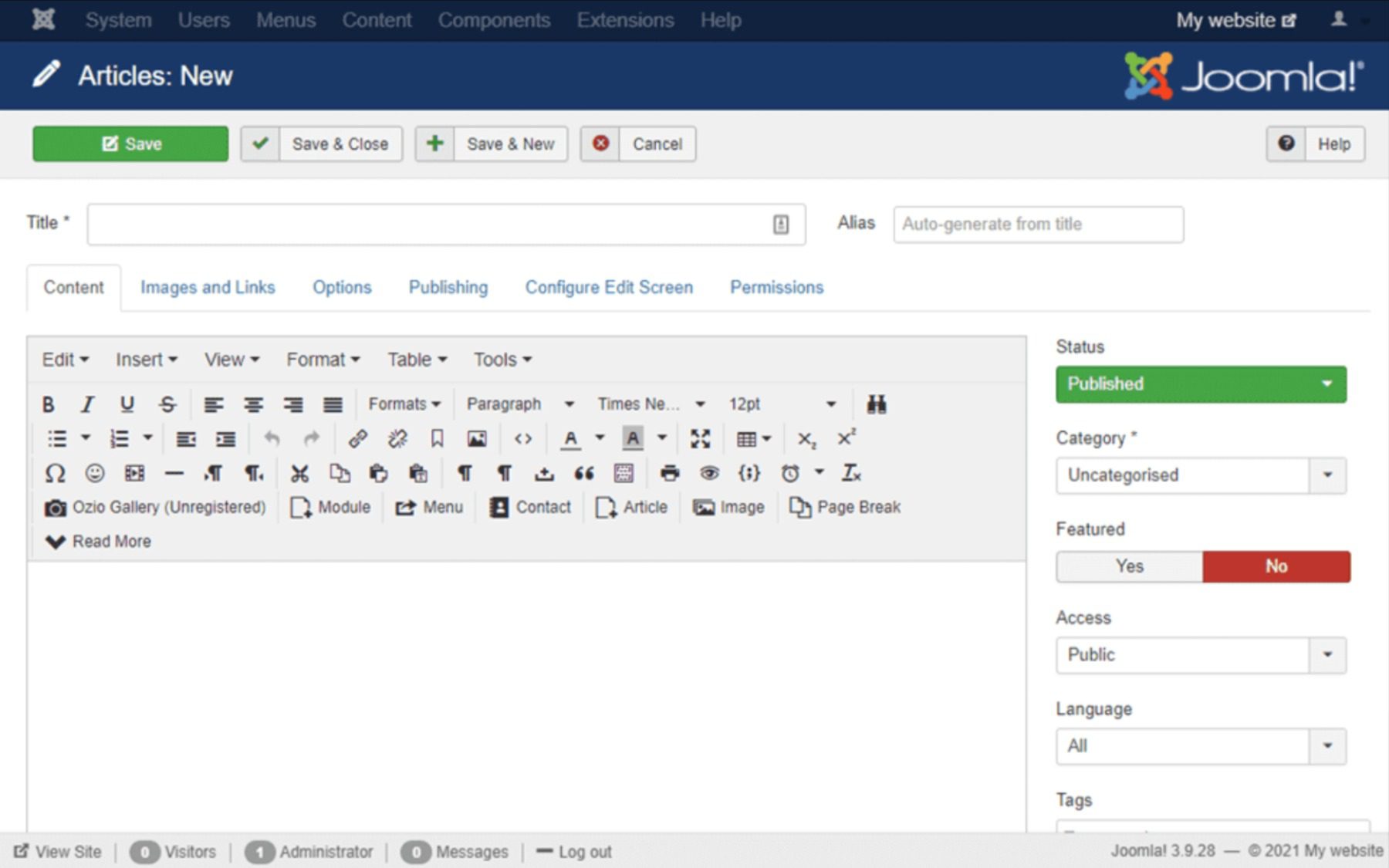
Like WordPress, you can edit your permalink here (called an Alias in Joomla), tags for your article, whether the article shows up as featured on your site, and various other permissions and options such as access levels and meta-data display.
One of the more confusing and confounding parts of the Joomla publishing process is that you press the same button (Add New Article) in the header menu to be taken to this same editor to create both regularly updated blog content (such as Posts in WordPress) and static pages (Pages in WP). The Category feature in Joomla is what keeps these separate.
Depending on the modules and extensions your site has installed (which we mentioned in the Customization section above), the category you choose dictates where this content appears. And they’re all created and managed from this single tool. This is incredibly powerful. And it’s actually pretty simple. But it’s a headache to use in practice, as setting up a site with the right categories to match all the content to match all the modules is not as simple as, for instance, WordPress taxonomies.
For sites that aren’t publishing regular content (or using a different platform for that), Joomla’s publishing tools may be just what you need to keep things organized.
Publishing Comparison
 |  |
|
|---|---|---|
| Publishing | 🥇 Winner WordPress is built for bloggers and content creators to publish their work quickly. Their interface is tried and true. | Joomla's main goal isn't centered around writing, so it's no wonder that their publishing work flow isn't as well-rounded as WordPress. Still, once you get used to it, it's not a bad solution. |
| Choose WordPress | Choose Joomla |
The Verdict
In the end, we feel that WordPress vs. Joomla comes down to the tech experience of the end user and what kind of site they need. For new site owners with no website experience, WordPress is by far the winner of this head-to-head. It does everything, and the learning curve is much lower. Plus, the ecosystem and third-party support are phenomenal. Everyone, from new users to veteran developers, can dig into WordPress and find their niche.
Final Comparison
 |  |
|
|---|---|---|
| Ease-of-Use | 🏳 Draw WordPress is relatively easy to use and most users will be acclimated within just a few minutes. However, the advanced features will take much longer to master. | 🏳 Draw Joomla's primary focus is on more advanced technical user, so it has a larger learning curve. |
| Customization | 🥇 Winner You can't really compare to WordPress when it comes to customization. It's what they've built their platform on and it requires little technical knowledge to integrate. | Joomla has a lot going for it in terms of customizability. But, it takes more technical experience to fully take advantage of the options available. |
| Publishing | 🥇 Winner WordPress is built for bloggers and content creators to publish their work quickly. Their interface is tried and true. | Joomla's main goal isn't centered around writing, so it's no wonder that their publishing work flow isn't as well-rounded as WordPress. Still, once you get used to it, it's not a bad solution. |
| Choose WordPress | Choose Joomla |
Joomla, on the other hand, caters very heavily to the experienced developer. Nowhere near as user-friendly as WordPress, Joomla gives you complete control over the entirety of your site. And it does so in the standard way, not the “WordPress Way.” For someone coming out of a boot camp or computer science program, Joomla may be where you feel more comfortable because it is definitely a more utilitarian platform. For content creators who will be using it daily to push out news or blogs, Joomla isn’t the best. But for sites not using it to create new content and run by developers, Joomla has a lot to offer. If you can find out how to do it.
WordPress Deep Dive
One more thing. Before you make your final decision on your website platform…are you curious to see how WordPress stacks up against its other biggest competitors? We did the hard work and compared WordPress vs. everything else so that you don’t have to! One of the comparisons we’ve done is WordPress vs. Drupal, and I think you will be interested to see the results.
If you’re looking for specific plugins to help WordPress become even more powerful, we recommend the following:
Frequently Asked Questions (FAQs)
Before we wrap up, let’s answer some of your most common questions about WordPress and Joomla. Did we miss one? Leave a question below, and we will respond!
Which is better, WordPress or Joomla?
What makes WordPress better than Joomla?
What is the main difference between WordPress and Joomla?
Which is better for SEO, WordPress or Joomla?
Is it easy to migrate from Joomla to WordPress?
Is WordPress faster than Joomla?
Is customizing WordPress easier than Joomla?
Which one has a better eCommerce solution, WordPress or Joomla?
Is Joomla more cost-effective than WordPress?
Which is more beginner-friendly, WordPress or Joomla?
What have been your experiences with WordPress vs. Joomla?

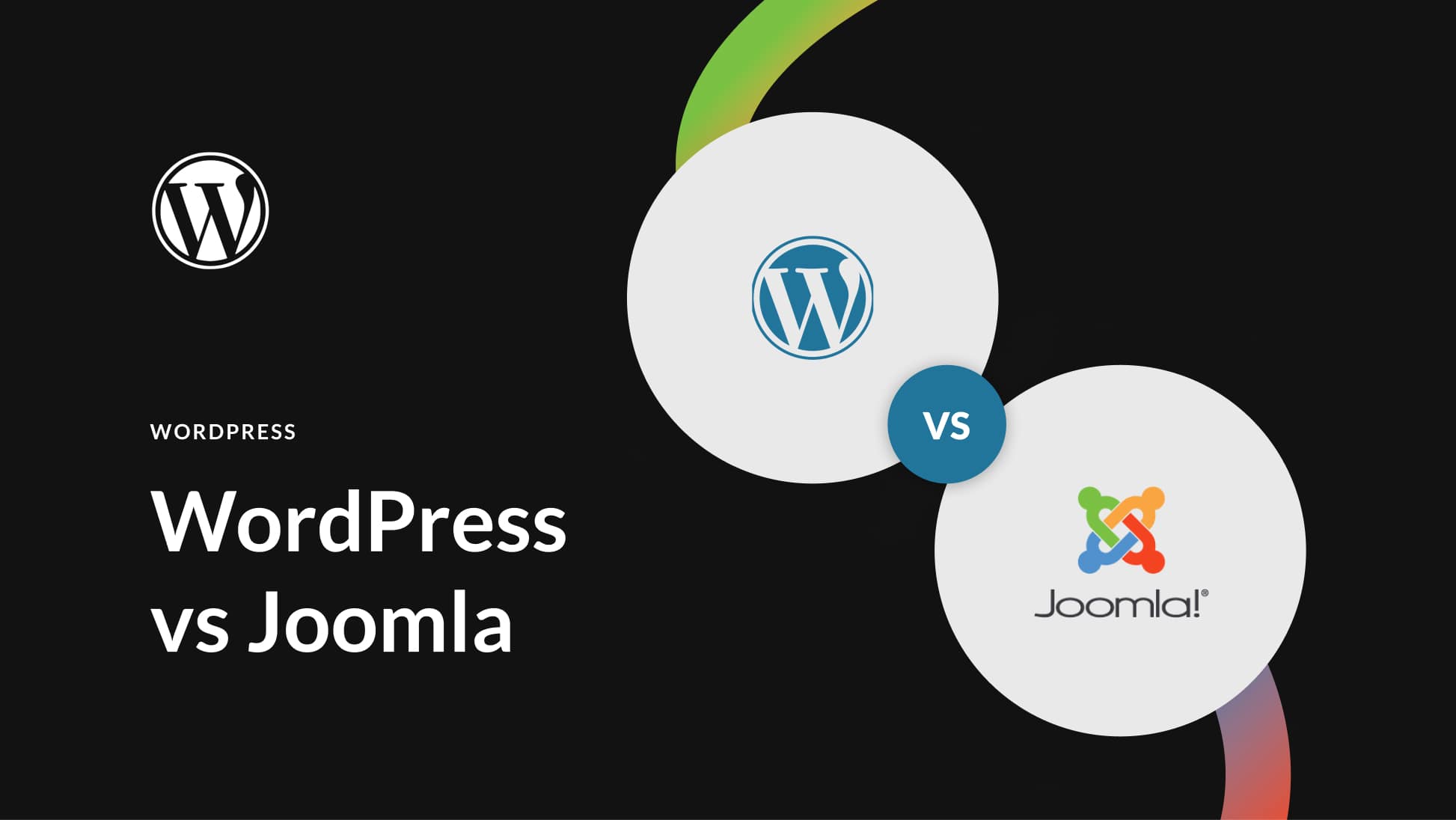






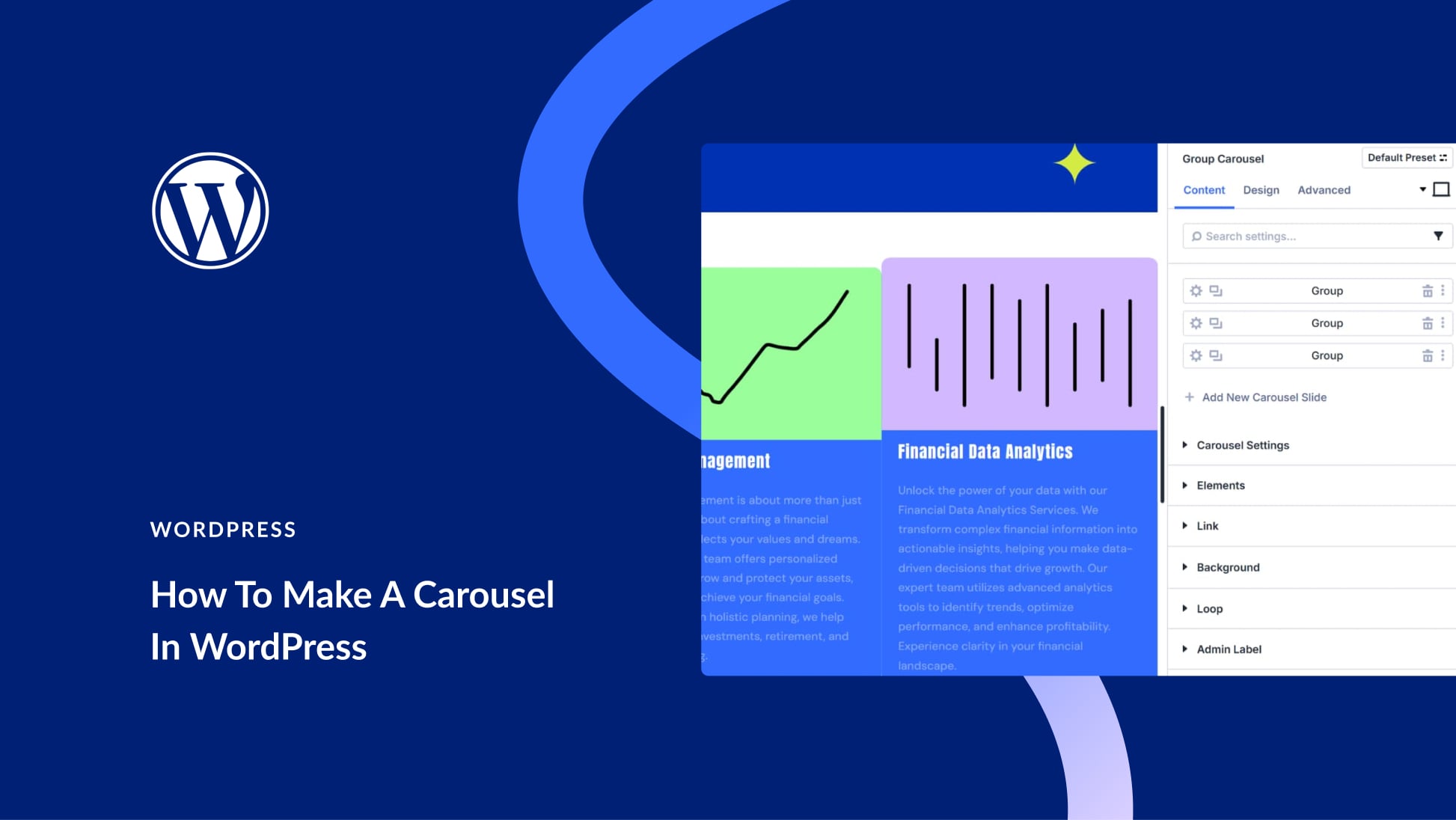
Joomla and WordPress are all fantastic content management systems. Joomla come with many more built-in features than WordPress. However, WordPress beats them with its ease of use, huge global community, plugins and themes. I feel that most non-developer users would find it much easier to build with WordPress than Joomla.
Hi Keeton,
Nice comparison of two solid competitors in the same niche WordPress and Joomla. Yes, it’s true WordPress is easy to install, learn, and easy to use for technical and non-technical users. Whereas Joomla is a developer tool, and I guess it is mostly used by developers and agencies, not by individuals. Both are great in their way. I have not tried Joomla so far because WordPress has all the features that I need to run my blog.
Thank you,
I am working with both cms. Both are king on their way. Both are comfortable and different features. I feel thankful to myself I handle both cms easily…
I have been using both WordPress and Joomla for over 10 years and I would have to say that Joomla is much much better than WordPress. Once you learn the basics of Joomla, you will find it a lot easier to use. WordPress is overrated because for every small customization, you need to buy a plugin and that’s where most people make their money from. I find WordPress a lot more frustrating to use than Joomla.
I don’t know why I get so frustrated reading content like this. I get equally frustrated when I read comments from people who actually understand how powerful Joomla is and wonder, why aren’t they (or myself) writing articles like this, extolling Joomla’s virtues? Oh sh*t, it’s 10pm and I have to finish an app to allow a property development company’s purchasers a means of selecting their decor upgrades in an interface similar to building a car on Ford’s website. Also, it needs to be able to push completed decor selection agreements over to DocuSign via API, that will in turn update the decor system after signature completion, which will then trigger the system generate a purchase order and push it over to the Constructor’s cloud service via their API, so the trades know what to install in each suite… People who understand what can be possible, understand the limits of WordPress (or at least understand how much effort would go into getting WordPress to be able to do the things you can quickly do in Joomla or Drupal). I don’t mean to say that there isn’t a learning curve, but the reward to learning how it works drastically flips the pros and cons. I’ve walked into projects that had cost companies tens of thousands of dollars in manpower alone because some contractor promised them “you can do that in WordPress” and when they actually delved into the requirements and understood the business logic (and the business rules), found themselves overwhelmed because there was so much custom programming needed. Whereas, with just the Fabrik extension in Joomla, I can build a proof of concept in a couple of days and tweak business rules as the concept is reviewed on-the-fly. Off to work…
Years ago I had to learn Joomla to take over a website. I found it very confusing. I was used to editing HTML in the old-fashioned way. I have since built all my sites using WordPress. With all the plugins and builders it is super easy BUT I have had many tell me that WordPress is not that secure. I use some very robust security plugins that seem to do a good job of controlling who gets in. Anyone have thoughts on WordPress security?
A bit of an oddly timed comparison since Joomla 4 is (finally) getting released. That said what joomla does exponentially better than WP is granularity. You have to add a bunch of third party stuff to wordpress to do what Joomla does out of the box for user types/groups and access levels. This can make for very customizable sites that you as the admin can present to different types of users. For example showing types of ads to one user group and different ads to another. Showing different content to different types of users. This is also why the module implementation in joomla is out of the box, superior to widgets and overall page building in wordpress. It is extremely simple to put elements in a very specific place in joomla without any extra php or css or customizing of themes.
The other area where Joomla is far superior is themes/templates. Specifically in joomla you can assign different themes (templates in joomla syntax) to different pages or parts of your site.
All that said I have been using both Joomla and WP for years (going back to the beginning for both) but the primary benefit of WP today, is the availability of 3rd party developers both for plugins and support. A lot of joomla 3pd have jumped ship and some of the more important components and plugins for joomla are not supported well. For me, Joomla 4 is too little, too late and Joomla, since day one has been filled with infighting from the core developers and this has led to defections and sometimes misplace priorities in the releases. But as a CMS it is better conceived than WP and WP would be a better CMS with some Joomla influences in these specific areas that I mentioned.
I’m surprised that Joomla still looks like this…
I’m a sporadic website content (& developer) updater. I find WordPress and plugins to be a steep learning curve. I was looking for a ‘WYSIWYG’ style of plugin like a word processor I’m familiar with. But this isn’t reality yet for me. It took me an hour, or so, to add text to an existing text layer, which didn’t accept all of my text, because I didn’t know how to lengthen a text box. I finally did discover it, but I’m still facing a steep learning curve as a casual website developer. Plugins don’t seem to reduce the learning curve. I still need to learn how to format the text as it doesn’t allow formatting within the text box, like a word processor does. Still annoying, but keep smiling, as I may learn something yet.
Out of the box, Joomla is vastly more powerful. it’s multi langage, you can batch copy or move menus and articles, fine access rights and much more. But WordPress is de facto standard and end users want WordPress, than means developers have to work with WordPress, not Joomla and it shows: you get vastly more powerful plugins for WordPress and there is nothing like Divi on Joomla platform.
Dommage you compare joomla3 to wp 5.8
Joomla 4 IS comming in August and propose a reply to every argument
For me wp IS realy good for simplier site but if you need to create more powerfull site or intranet joomla IS realy better with full level Access (acl) multilingue and module(widget) assignation out of box in core
Neither are particularly intuitive designs. Both are captives of their history. It’s interesting that WordPress morphed into a CMS from blogging roots and became a more effective CMS than Joomla, which started life as a CMS.
WordPress is impressive at building pages and blogging. I still don’t care for the way media is handled in WordPress vs Joomla. I also like Joomla’s Access Control List that are built-in. Sometimes with WordPress I have added so many third party plugins that I worry how stable the site will be in the long run. I feel that Joomla has components built-in so I feel like they have worked out the bugs and the site will be stable longer.